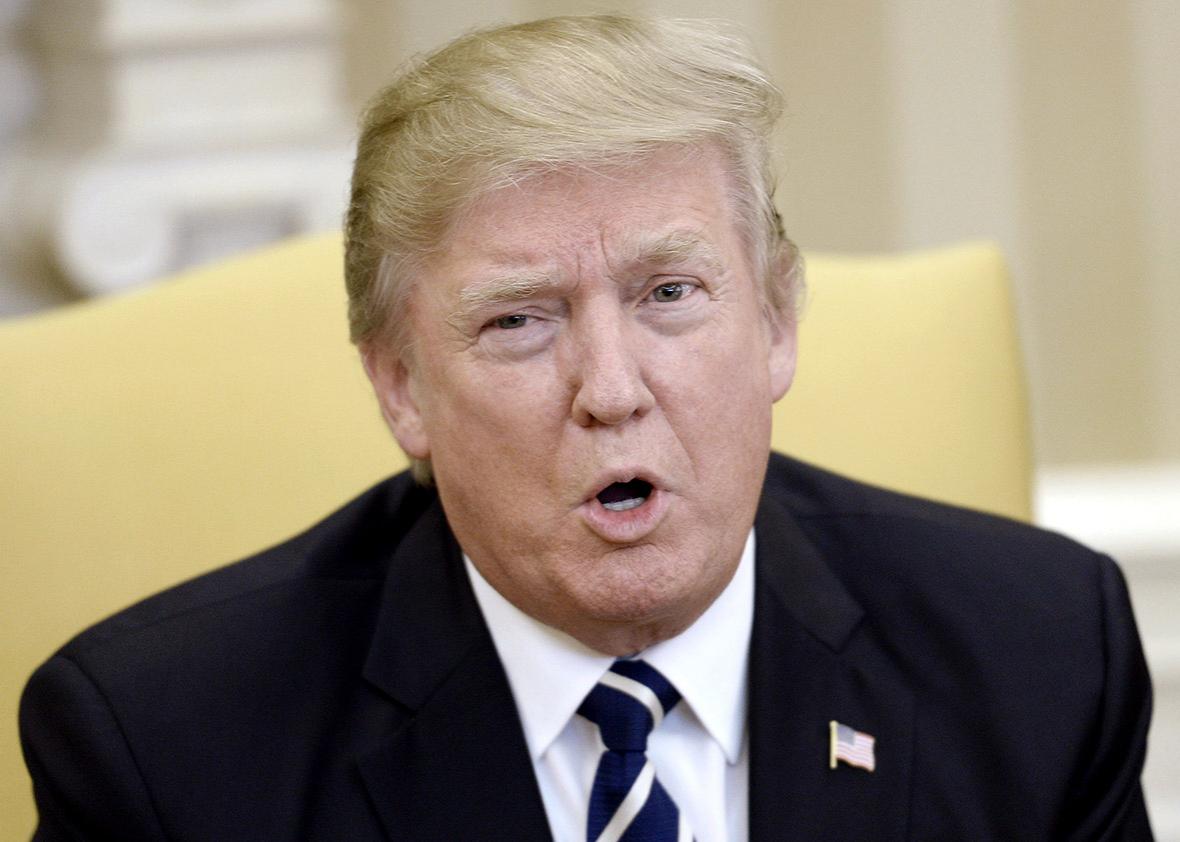Is This Normal? is a Slate series that attempts to determine which controversial Trump World behaviors are outrageously unprecedented, which are outrageous but within the realm of what others have gotten away with, and which shouldn’t be considered outrageous at all.
The Issue
The Washington Post reported on Monday that, according to former and current U.S. officials, President Trump revealed highly classified information to Russia’s foreign minister and ambassador to the United States during a meeting at the White House last week. The information, related to an alleged ISIS plot involving laptops on airplanes, was reportedly provided to the U.S. by an ally. While Trump did not reveal specific sources and methods, according to the Post’s sources, the specificity of the information was apparently such that it could allow the Russians to piece together how the partner had gathered the intel. The president “revealed more information to the Russian ambassador than we have shared with our own allies,” one official told the Post. Trump also reportedly boasted, “I get great intel. I have people brief me on great intel every day.”
Is this normal?
The Precedent
Every president uses the “great intel” he’s briefed on to accomplish his foreign policy goals. That’s what the intel is for. But presidents “have been very wary about sharing sources and methods either directly or indirectly, because that would jeopardize the very mechanisms for getting them the information they need to make decisions,” says David Priess, a former CIA intelligence briefer and author of the President’s Book of Secrets, a history of the president’s daily brief, or PDB.
Still, Priess says it’s not unheard of for the White House to reveal classified information to foreign governments, including to countries like Russia that are not exactly close allies. But usually, there’s a pretty good reason for it. For instance, when the Kennedy administration revealed spy-plane photos showing Soviet missile positions in Cuba in 1962, in the buildup to the Cuban missile crisis, it may have given the Soviets some valuable information about U.S. reconnaissance capabilities, but that also helped the U.S. gain international support.
Intelligence sharing is not always quite so on the up and up. In 1971, for example, Henry Kissinger arranged a secret meeting with the Chinese ambassador to the United Nations to reveal that the Nixon administration was secretly—and illegally—providing weapons to Pakistan in the Indo-Pakistan war, hoping to induce the Chinese to take a more active role in the conflict.
The president himself sharing classified information in a private conversation is another matter, though also not entirely without precedent. Priess points out that George W. Bush invited several foreign leaders to join him for his daily classified briefings, including British Prime Minister Tony Blair, Japanese Prime Minister Junichiro Koizumi, Spanish Prime Minister José María Aznar, and—yes—Russian President Vladimir Putin.
“These were not ad hoc events. These were not matters of presidential whim,” notes Priess. The CIA was informed in advance, and special briefings were prepared that did include real, classified information, but nothing that would be damaging for the other government to know. It’s possible that they were also tailored to convince the other leader of something in particular. One CIA briefer in Priess’ book recalls that, for the Putin meeting, “It was a scramble to find material we could release to the Russians.”
“Presidents have routinely discussed classified information with foreign officials,” Tim Naftali, a presidential historian at New York University told me. “They discuss military capabilities, contingencies, and plans with allies and sometimes with adversaries. They broker secret diplomatic deals. But if what is being shared is sensitive intelligence, and the recipient is not a member of the [intelligence alliance] Five Eyes club, then there is a question as to whether the instance of presidential sharing was an act of considered policy or just cluelessness.”
If the Washington Post story is correct—National Security Adviser H.R. McMaster, who was in the room, says it’s false, though it’s not quite clear what aspects of the Post’s reporting he’s referring to—it’s hard to discern what foreign policy goal Trump could have thought he was accomplishing. It’s already known that the U.S. is worried about a laptop plot. That’s why a ban on electronic devices on flights from several Middle Eastern airports was announced last month. Why reveal the city in ISIS–controlled territory where the information about the plot was collected, as Trump reportedly did? It also does not appear that the CIA was aware in advance that this information would be revealed. The Post reports that immediately after the meeting, “senior White House officials took steps to contain the damage, placing calls to the CIA and the National Security Agency.”
The Verdict
Revealing classified information to accomplish a foreign policy goal is Normal. Revealing highly classified intelligence casually in conversation for no particular reason, if that is in fact what Trump did, is Not Normal. As Priess puts it, “This is certainly an aberration. We don’t know if it was catastrophic without knowing the details of what was said or how it was said.”
